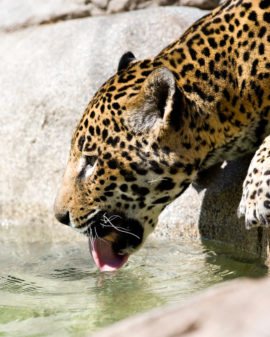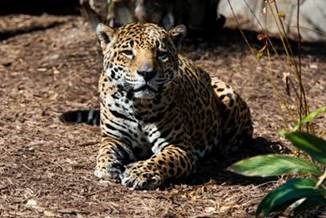Mourning the Loss of Our Geriatric Jaguar, Kan Balam
 This morning, the Houston Zoo humanely euthanized its male, 20-year-old jaguar, Kan Balam. Due to the tremendous care provided to him by his keepers and the Houston Zoo veterinary team, Kan Balam lived well beyond his expected lifespan. Jaguars expected lifespan in the wild is between 12-15 years.
This morning, the Houston Zoo humanely euthanized its male, 20-year-old jaguar, Kan Balam. Due to the tremendous care provided to him by his keepers and the Houston Zoo veterinary team, Kan Balam lived well beyond his expected lifespan. Jaguars expected lifespan in the wild is between 12-15 years.
The carnivore staff and veterinary team made the decision after his quality of life began to decline. Quality care and continuous advances in veterinary medicine extends animals’ lives longer than ever, with most felines in human care living well beyond previous generations. Because of this, all cats, including domestic house cats and jaguars, often spend a significant phase of their lives as older animals, and are at a higher risk for geriatric complications.
Kan Balam was well known as one of the carnivore department’s most intelligent animals. The great-grandfather knew about 30 different behaviors and found joy in attempting to outsmart his keepers who dedicated their lives to caring for him.
 “When caring for aging animals, we first do everything in our power to make sure they have a great quality of life,” said Lisa Marie Avendano, vice president of animal operations at the Houston Zoo. “We manage their diet and exercise, as well as their medication if necessary. It is never an easy decision to euthanize an animal, but it is one we make with the animal’s well-being as the top priority. With world-class animal keepers, four incredible veterinarians, and a complete veterinary hospital complex, our animals receive the best care possible, and that includes end-of-life decisions.
“When caring for aging animals, we first do everything in our power to make sure they have a great quality of life,” said Lisa Marie Avendano, vice president of animal operations at the Houston Zoo. “We manage their diet and exercise, as well as their medication if necessary. It is never an easy decision to euthanize an animal, but it is one we make with the animal’s well-being as the top priority. With world-class animal keepers, four incredible veterinarians, and a complete veterinary hospital complex, our animals receive the best care possible, and that includes end-of-life decisions.
Kan Balam was born at a zoological facility in Mexico. His keepers often refer to him as “Kan B” for short. Before coming to the Houston Zoo, he had an altercation with another jaguar and lost part of his front right foot and for many years received laser acupuncture and annual chiropractic adjustments.
Jaguars range covers South and Central America, with some venturing north into Mexico and southwestern US. They are listed as near threatened by International Union of Conservation of Nature (IUCN) and their numbers continue to decline mostly due to habitat loss. The Houston Zoo is protecting jaguars in the wild by providing support to conservation partners in Brazil who work with the Brazilian government on saving the forested homes of these beautiful cats.
